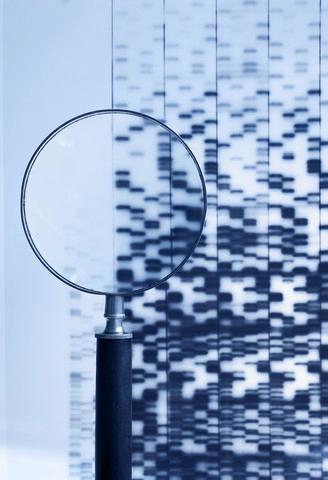Genes a Molecular View
 >
>
Life and Chemistry...
Ready...
In this lesson, we will address genes from a molecular, or chemical, view.
What is the effect of changing our environment or body chemistry? Anything?
What is our genetic code?
Where is our genetic code stored?
Define and explain, in biochemical terms, what the function of a gene has in a living cell.
The vocabulary carries over from the last lesson.
Genetics Crossword
Open and complete the genetics crossword .
Brainstorm: What can molecular biology tell us about ourselves?
Remember SNPs? What is a SNP, and what do they do?
Set...
Find a definition of variance. Write it down in your lab book.
Variations are the differences between things. Does it sound like vary?
The following video describes DNA, chromosome, and genes from a biochemical perspective.
After watching the video, describe the chemistry of chromosomes and genes in your notebook or notes.
Like last time, there is a follow-on quiz, so remember to take notes.
Go...
What are protiens?
With your lab partner, describe the relationship between DNA and proteins. In your reflection notebook, write a paragraph or two about:
In your reflection notebook write a paragraph or two about:
1. The many ways that enzymes can function inside of cells.
2. What is our genetic code? Where is it stored?
What is a catalyst?
Could the cell function without a catalyzing agent?
Mutations
Sounds like mutants. Aren't mutants scary?
All of us are different, but that doesn't make us a 'mutant'.
With your lab partner, discuss what you think a mutant is and what happens if we discover a mutant, or mutation, in our genes.
As part of your discussion, talk about how mutations occur. Describe them first in your own words, then in biochemical terms.
How would mutations affect the ability to control bacteria, weeds, or insects?
How are mutations created through sexual reproduction?
Write your discussion notes in your lab notebook. Post your notes to the Lesson group form (Understanding Genetics). Remember, preface your notes with your group id.
Finish Early
Here is an additional advanced video. It addresses with insertion and deletion mutations. It also addresses the effects of mutations on an organism.
For 20 points credit:
Write a short story about mutants.
The story will contain biomedical terms that you learned in the prior section.
To help with completing the story, you could look up news stories about hospitals, or four clinics, that have had trouble removing infections.
We will submit the best stories to the school newspaper, or you can post them on your website.